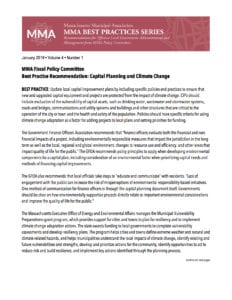Who is a member?
Our members are the local governments of Massachusetts and their elected and appointed leadership.
 The MMA will release the fourth edition of its municipal Best Practices series at the MMA Annual Meeting & Trade Show on Jan. 18 and 19.
The MMA will release the fourth edition of its municipal Best Practices series at the MMA Annual Meeting & Trade Show on Jan. 18 and 19.
The recommendations range from developing human resource planning policies to addressing alternative sustainable solutions to waste and energy.
• MMA Best Practices Vol. 4 (200K PDF)
The following is an outline of the 10 Best Practices for 2019:
Accessory Dwelling Units
Best Practice: Consider updating accessory dwelling unit bylaws, taking into consideration successful techniques used in communities large and small across the Commonwealth.
Capital Planning and Climate Change
Best Practice: Develop, and include in local capital improvement plans, specific policies and practices to ensure that new and upgraded capital equipment and projects are protected from the impact of climate change.
Human Resources Professionals
Best Practice: Hire a dedicated human resources professional to improve compliance with labor laws and regulations, defray costs, and reduce risks in the municipal workplace.
Investment in Electric Vehicles and Charging Stations
Best Practice: Municipalities can promote alternative energy use and decrease fossil fuel dependence by investing in electric or hybrid vehicles for their municipal fleets and building charging stations on municipal property for public use.
Municipal Solid Waste Diversion Programs
Best Practice: Reduce solid waste tonnage and promote sustainable alternatives to waste disposal by creating or partnering on municipal diversion programs such as for organic waste and textiles.
Professional Development for Municipal Officials
Best Practice: Promote the development of cross-functional skills in order to create a more well-rounded view of municipal officials’ mission as leaders, managers and collaborators in local government.
Recreational Marijuana
Best Practice: For municipalities that have opted not to impose a ban, including those that are engaged in planning and decision-making while a temporary moratorium is in place, adopt a set practice or community policy for the review of applications and the negotiation of host community agreements.
Social Media, Open Meeting Law and Public Records Law
Best Practice: Develop a detailed written policy on the use of social media by employees and officials.
Sustainable Wood Debris Management Plan
Best Practice: In order to address an increase in wood debris from weather events and pest infestations, and limited disposal options, develop a sustainable wood debris management plan.
Wellness Programs for Municipal Employees
Best Practice: Implement effective wellness programs to create a culture of health in the workplace that integrates the employer’s mission with the individual health needs of employees.
The new Best Practices build on the total of 27 recommendations published in 2016, 2017 and 2018. These earlier recommendations, available at www.mma.org/bestpractices, address issues such as snow and ice budgeting, emergency management, climate change adaptation, municipal reserves, managing unemployment insurance claims, and a range of other municipal areas of operation.
Best practice topics are generally chosen by the five MMA policy committees early in the year and developed and refined at meetings in the fall.
Some of the suggested practices are based on recommendations developed by national organizations as well as state and regional agencies such as the Massachusetts Department of Environmental Protection and the Metropolitan Area Planning Council. Other suggested practices are based on successful programs in Massachusetts cities and towns.
The MMA is now beginning to plan its 2020 Best Practices volume. Those with ideas for topics are invited to stop by the MMA booth at the Trade Show and talk to MMA policy committee staff.